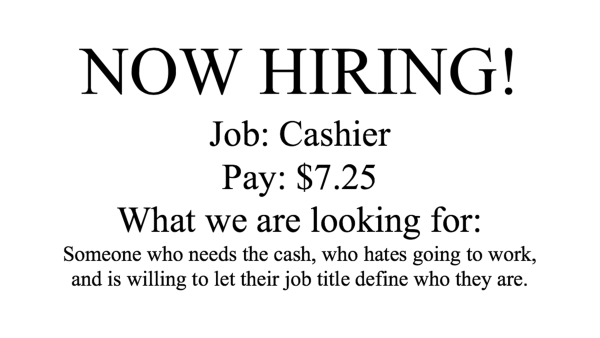 Most times when we meet new people we ask, “so what do you do?” We ask someone what his or her job is because we want to know more about him or her.
Most times when we meet new people we ask, “so what do you do?” We ask someone what his or her job is because we want to know more about him or her.
They usually respond something like: I am a painter. I was a cook. I am an accountant. I was a banker. I am a doctor.
One potential reason why we ask such a question is because jobs are always on our mind. Employment dominates our lives if you think about it. Having a job is almost a necessity nowadays because we need to make money to live a good life. That’s the way it is. We also get in the habit of judging others based on their job position and on how much money they make, usually because that’s what we’re used to doing.
Imagine you meet two new people. You don’t know either of their jobs. Both individuals are very nice and sincere, and both seem very sophisticated. Would you be surprised if you found out one was an established doctor and the other a cashier at a fast-food restaurant?
We put so much into trying to land a job, and once we have one, then we’re always looking to upgrade to a higher-paying one. I guess this goes to show how focused we are on the almighty dollar. But is your job really about the money, or is it about something else?
Do we “work” so that we can put bread on the table? Or do we work because our job is something we like to do? Is what you “do” for yourself? Or is what you “do” for the benefit for others? Furthermore, is what you “do” your job title? Or is what you “do” the actual things you perform at your job?
We need to ask ourselves these questions because if we don’t, we could let the obsession with jobs get the best of us. Too often we meet individuals who are unhappy with their job, or who get stuck with a job that they don’t like and are never able get out of it. I call this the “job-trap.”
A classic example of the job-trap is the middle-aged adult who after some 10-30 years of work finally realizes what they have been doing has left them unsatisfied and unfulfilled. Getting caught in the job-trap is not the same as struggling to find a job in the first place. It’s one thing to have limited choices regarding employment. It’s an entirely different thing to have choices but to still choose a job that will leave you unsatisfied. When you do this, and become content with being discontent, you fall into the trap.
Getting caught in the job-trap has to do with the understanding of what a job is. Too many of us think of our job solely as a means to put bread on the table. We view our job as a task, an obligation we have to complete in order to get the paycheck. Work is work. You find a job that’s halfway decent and then grow into it. This traditional view of a job is fine for many of us, that’s just the way job is and always has been. But is it still fine when at age 50 you realize what you’ve been doing has not made you happy, that you gave up on your dreams?
Our view of jobs needs to be something that goes beyond “work.” We need to start viewing employment as more than just a means to the almighty dollar. We need to remember that our job can be something we enjoy and gain meaning from. We need to start seeing our job not as service to our wallets, but as service to mankind. We also need to view a job as an available outlet for us to experience vocation.
Maybe we should be less willing to take what comes along and more willing to chase our dreams. Maybe we should choose a job in which the things we would do on the outside would match up with who we are on the inside. Maybe we should dare to step away, just for a moment, from the traditional view of a job. Maybe we should step towards a new view, in which the world is a happier place because you are a happier person, because you are happy with what you do.
Maybe we should also be reasonable.
It’s great and fun to be idealistic and say all this stuff, but let’s also be real. Just because you want a job that will make you happy doesn’t mean you always end up with one that does. And that’s okay!
The thing about the job-trap is you don’t necessarily have to change jobs to get out of it. You can change your attitude. Whatever job we have, we have a choice to view it first and foremost as service. Your job is not a name, nor a title. It is what you do for others. If we choose to view our job this way, we realize there is no small job.
-Colin Reike
